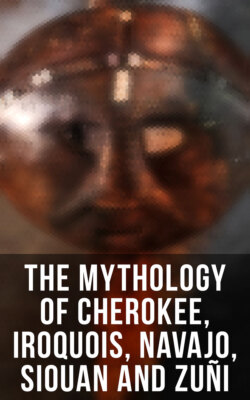Читать книгу The Mythology of Cherokee, Iroquois, Navajo, Siouan and Zuñi - James Mooney - Страница 223
На сайте Литреса книга снята с продажи.
The Snake-Wife
ОглавлениеA certain chief advised his son to travel. Idling, he pointed out, was not the way to qualify for chieftainship.
"When I was your age," said he, "I did not sit still. There was hard work to be done. And now look at me: I have become a great chief."
"I will go hunting, father," said the youth. So his father furnished him with good clothing, and had a horse saddled for him.
The young man went off on his expedition, and by and by fell in with some elk. Shooting at the largest beast, he wounded it but slightly, and as it dashed away he spurred his horse after it. In this manner they covered a considerable distance, till at length the hunter, worn out with thirst and fatigue, reined in his steed and dismounted. He wandered about in search of water till he was well-nigh spent, but after a time he came upon a spring, and immediately improvised a song of thanksgiving to the deity, Wakanda, who had permitted him to find it. His rejoicing was somewhat premature, however, for when he approached the spring a snake started up from it. The youth was badly scared, and retreated to a safe distance without drinking. It seemed as though he must die of thirst after all. Venturing to look back after a time, he saw that the snake had disappeared, and very cautiously he returned. Again the snake darted from the water, and the thirsty hunter was forced to flee. A third return to the spring had no happier results, but when his thirst drove him to a fourth attempt the youth found, instead of a snake, a very beautiful woman. She offered him a drink in a small cup, which she replenished as often as he emptied it. So struck was he by her grace and beauty that he promptly fell in love with her. When it was time for him to return home she gave him a ring, saying: "When you sit down to eat, place this ring on a seat and say, 'Come, let us eat,' and I will come to you."
Having bidden her farewell, the young man turned his steps homeward, and when he was once more among his kindred he asked that food might be placed before him. "Make haste," said he, "for I am very hungry."
Quickly they obeyed him, and set down a variety of dishes. When he was alone the youth drew the ring from his finger and laid it on a seat. "Come," he said, "let us eat."
Immediately the Snake-woman appeared and joined him at his meal. When she had eaten she vanished as mysteriously as she had come, and the disconsolate husband (for the youth had married her) went out of the lodge to seek her. Thinking she might be among the women of the village, he said to his father: "Let the women dance before me."
An old man was deputed to gather the women together, but not one of them so much as resembled the Snake-woman.
Again the youth sat down to eat, and repeated the formula which his wife had described to him. She ate with him as before, and vanished when the meal was over.
"Father," said the young man, "let the very young women dance before me."
But the Snake-woman was not found among them either.
Another fleeting visit from his wife induced the chief's son to make yet another attempt to find her in the community.
"Let the young girls dance," he said. Still the mysterious Snake-woman was not found.
One day a girl overheard voices in the youth's lodge, and, peering in, saw a beautiful woman sharing his meal. She told the news to the chief, and it soon became known that the chief's son was married to a beautiful stranger.
The youth, however, wished to marry a woman of his own tribe; but the maiden's father, having heard that the young man was already married, told his daughter that she was only being made fun of.
So the girl had nothing more to do with her wooer, who turned for consolation to his ring. He caused food to be brought, and placed the ring on a seat.
